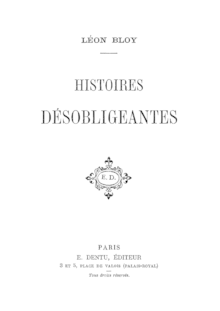Disagreeable Tales
 Title page | |
| Author | Léon Bloy |
|---|---|
| Original title | Histoires désobligeantes |
| Translator | Erik Butler |
| Country | France |
| Language | French |
| Publisher | Dentu |
Publication date | 1894 |
Published in English | 2015 |
| Pages | 369 |
Disagreeable Tales (French: Histoires désobligeantes) is an 1894 short story collection by the French writer Léon Bloy. It consists of 30 tales set in Paris, focused on criminality, perversions and other subject matters typical of the decadent movement. The common theme is the faith in God in a time of human spiritual crisis.[1] An English translation by Erik Butler was published in 2015 by Wakefield Press.[2]
Stories
- Herbal Tea
- The Old Man of the House
- The Religion of Monsieur Pleur
- The Parlor of Tarantulas
- Draft for a Funeral Oration
- The Prisoners of Longjumeau
- A Lousy Idea
- Two Ghosts
- A Dentist's Terrible Punishment
- The Awakening of Alain Chartier
- The Stroker of Compassion
- Monsieur's Past
- Whatever You Want!
- Well-Done
- The End of Don Juan
- A Martyr
- Suspicion
- The Telephone of Calypso
- A Recruit
- Botched Sacrilege
- It's Gonna Blow!
- The Silver Lining
- A Well-Fed Man
- The Lucky Bean
- Digestive Aids
- The Reading Room
- Nobody's Perfect
- Let's Be Reasonable!
- Jocasta on the Streets
- Cain's Luckiest Fine
Reception
Erik Morse wrote for The Paris Review in 2015: "What distinguishes Bloy's 'tales' from those written by Villiers de L'Isle-Adam, Poe, and Lautréamont is the marked absence of any sensualist or proto-surrealist tone with its ecstatic invocations of the flesh, like those that characterize Romantic literature since William Blake. Rather, Bloy's bilious allusions to excrement ('ordure'), genitalia, rot, disease, and waste descend from a negative theology, which extols a mystical, self-mortification[.] ... For Bloy, all physical pleasures are diversion or, worst yet, satanic temptation, so it is only through intense suffering and punishment that his characters can expiate their sins."[1]
References
| French Wikisource has original text related to this article: |
- 1 2 Morse, Erik (2015-07-14). "Léon Bloy's Decadent, Perverse 'Disagreeable Tales'". The Paris Review. Retrieved 2015-10-27.
- ↑ "Disagreeable tales". WorldCat. Retrieved 2015-10-27.
External links
- Publicity page at the American publisher's website